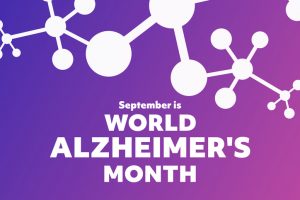 Approximately 5.8 million Americans experience Alzheimer’s disease and related forms of dementia, according to the Centers for Disease Control and Prevention (CDC). Dementia is a general term that refers to memory loss; Alzheimer’s is the most common form of dementia, accounting for up to 80% of cases.
Approximately 5.8 million Americans experience Alzheimer’s disease and related forms of dementia, according to the Centers for Disease Control and Prevention (CDC). Dementia is a general term that refers to memory loss; Alzheimer’s is the most common form of dementia, accounting for up to 80% of cases.
The earliest signs of Alzheimer’s involve difficulty retaining new information, but can also involve vision or language-related problems. These symptoms gradually transition into more severe problems such as worsening confusion and memory loss, changes in mood and behavior, and difficulty speaking and swallowing. These problems are likely to be less obvious to the person experiencing them than to others who interact with them regularly.
Alzheimer’s is believed by medical experts to be caused by buildups of proteins such as amyloid, which forms plaque around brain cells, and tau, which forms tangles within brain cells. These buildups lead to lower levels of neurotransmitters, such as acetylcholine, which send signals between brain cells. Other factors that increase a person’s likelihood of experiencing Alzheimer’s include:
- Age
- Family history
- Down’s syndrome
- Head trauma
- Cardiovascular disease
- Untreated depression
There is currently no cure for Alzheimer’s; symptoms can only be managed as they progress. Some ways that caregivers can help a person with Alzheimer’s cope with their symptoms include:
- Helping them maintain a regular daily routine
- Reassuring them and acknowledging their feelings
- Avoiding showing frustration or anger with them
- Avoiding arguments with them
- Making sure they have a safe space to walk
- Helping them stay hydrated and fed throughout the day
If you or a loved one is experiencing symptoms associated with Alzheimer’s, you can receive treatment from a neurologist at Flushing Hospital Medical Center’s Ambulatory Care Center. To schedule an appointment, please call (718) 670-5486.
All content of this newsletter is intended for general information purposes only and is not intended or implied to be a substitute for professional medical advice, diagnosis or treatment. Please consult a medical professional before adopting any of the suggestions on this page. You must never disregard professional medical advice or delay seeking medical treatment based upon any content of this newsletter. PROMPTLY CONSULT YOUR PHYSICIAN OR CALL 911 IF YOU BELIEVE YOU HAVE A MEDICAL EMERGENCY.


